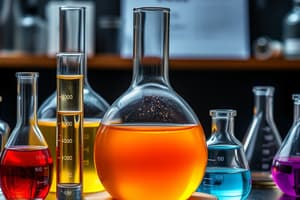Podcast
Questions and Answers
Which of the following is NOT a fundamental unit in the International System of Units (SI)?
Which of the following is NOT a fundamental unit in the International System of Units (SI)?
- Kilogram
- Liter (correct)
- Second
- Ampere
What does the term 'significant figures' convey in a measurement?
What does the term 'significant figures' convey in a measurement?
- The number of times the measurement was repeated
- The precision of the measurement (correct)
- The uncertainty of the measurement
- The accuracy of the measuring instrument
Which of the following is a characteristic of a testable scientific question?
Which of the following is a characteristic of a testable scientific question?
- It should be complex and impossible to answer definitively.
- It should be subjective and open to interpretation.
- It should be based on personal beliefs and opinions.
- It should be able to be investigated through observation, experimentation, or data analysis. (correct)
What is the primary purpose of a control group in an experiment?
What is the primary purpose of a control group in an experiment?
Which of the following is NOT a key aspect of critical thinking in science?
Which of the following is NOT a key aspect of critical thinking in science?
How does recognizing personal biases contribute to objective scientific evaluation?
How does recognizing personal biases contribute to objective scientific evaluation?
What is the main distinction between correlation and causation?
What is the main distinction between correlation and causation?
Why is it important to communicate scientific results clearly?
Why is it important to communicate scientific results clearly?
What is the first step in the scientific method?
What is the first step in the scientific method?
Which of the following best describes a scientific law?
Which of the following best describes a scientific law?
What differentiates scientific theories from scientific laws?
What differentiates scientific theories from scientific laws?
Which branch of science focuses on the study of living organisms?
Which branch of science focuses on the study of living organisms?
What is a hypothesis?
What is a hypothesis?
Why is the scientific method considered iterative?
Why is the scientific method considered iterative?
Which of the following is NOT a key element of the scientific method?
Which of the following is NOT a key element of the scientific method?
What is the role of data analysis in the scientific method?
What is the role of data analysis in the scientific method?
Flashcards
Scientific Method
Scientific Method
A systematic process for investigating phenomena and developing theories in science.
Observation
Observation
Noticing and describing events or phenomena in the natural world.
Hypothesis
Hypothesis
A testable explanation for an observed phenomenon.
Experiment
Experiment
Signup and view all the flashcards
Prediction
Prediction
Signup and view all the flashcards
Scientific Law
Scientific Law
Signup and view all the flashcards
Scientific Theory
Scientific Theory
Signup and view all the flashcards
Branches of Science
Branches of Science
Signup and view all the flashcards
Scientific Measurements
Scientific Measurements
Signup and view all the flashcards
International System of Units (SI)
International System of Units (SI)
Signup and view all the flashcards
Fundamental Units
Fundamental Units
Signup and view all the flashcards
Significant Figures
Significant Figures
Signup and view all the flashcards
Scientific Inquiry
Scientific Inquiry
Signup and view all the flashcards
Critical Thinking
Critical Thinking
Signup and view all the flashcards
Causation vs. Correlation
Causation vs. Correlation
Signup and view all the flashcards
Experimental Design
Experimental Design
Signup and view all the flashcards
Study Notes
Scientific Method
- Science is a systematic approach to understanding the natural world.
- The scientific method is a process for investigating phenomena, solving problems, or developing theories about the natural world.
- It involves making observations, forming hypotheses, designing experiments, analyzing data, and drawing conclusions.
- Key elements include:
- Observation: noticing and describing events or phenomena in the natural world.
- Question: formulating a question about the observed phenomenon.
- Hypothesis: a testable explanation for the observed phenomenon.
- Prediction: a statement of what will happen if the hypothesis is correct.
- Experiment: a controlled test of the hypothesis.
- Data analysis: examining the data collected during the experiment.
- Conclusion: determining whether the data support the hypothesis.
- The scientific method is iterative; conclusions can lead to new questions and further experimentation.
- Science is a dynamic process, constantly revised and refined as new evidence emerges.
Branches of Science
- Science is categorized into different branches, each focusing on a specific aspect of the natural world.
- These disciplines often overlap and build upon each other.
- Major branches include:
- Physical Sciences: Physics, Chemistry, and Astronomy.
- Life Sciences: Biology, Botany, Zoology, and Ecology.
- Earth Sciences: Geology, Meteorology, Oceanography, and Environmental Science.
- These branches use different methods and tools, but share fundamental principles of the scientific method.
Scientific Laws and Theories
- Scientific laws describe consistently observed relationships in nature.
- Laws are concise statements about how nature behaves.
- They are supported by extensive empirical evidence and are generally considered universally true.
- Examples include Newton's laws of motion and the laws of thermodynamics.
- Scientific theories explain why a natural phenomenon occurs.
- Theories are well-substantiated explanations of aspects of the natural world, based on extensive evidence.
- They are more comprehensive than laws and often incorporate multiple laws.
- Examples include the theory of evolution and the theory of relativity.
- Importantly, theories are not guesses; they are the most reliable explanations science offers.
Scientific Measurement and Units
- Measurements are crucial in science.
- Scientific measurements use standard units for consistency and accuracy.
- The International System of Units (SI) is the worldwide standard.
- Fundamental SI units include meters (length), kilograms (mass), seconds (time), and amperes (electric current).
- Accuracy and precision are important for scientific validity.
- Measurements have uncertainties or errors due to tools, methods, or the observer.
- Significant figures indicate the precision of a measurement. Proper use of significant figures is vital to avoid misrepresenting data.
Scientific Inquiry
- Scientific inquiry encompasses the broader process behind scientific exploration and knowledge advancement.
- It emphasizes skepticism, critical thinking, and the importance of evidence-based reasoning.
- Key aspects include:
- Developing testable questions—crucial for scientific progress.
- Determining appropriate methodologies, including the careful design of experiments for accurate data, including clear controls and procedures.
- Evaluating the validity and reliability of data—ensuring accuracy, precision, consistency, and alignment with the hypothesis.
- Clearly communicating results—sharing findings with the scientific community and public, documenting data and methods, and presenting findings in accessible formats (e.g., scientific journals).
- Scientific inquiry is an iterative process, not linear, involving repetition from observations, testing, and refining understanding.
Critical Thinking in Science
- Critical thinking is essential for evaluating scientific claims and understanding results.
- It involves:
- Evaluating source validity and potential biases.
- Identifying assumptions in experiments (implicit or explicit).
- Questioning data interpretations and conclusions to ensure evidence support.
- Considering alternative explanations and perspectives.
- Recognizing personal biases is integral to objective evaluation.
- Understanding the difference between correlation and causation is critical for assessing scientific outcomes.
Studying That Suits You
Use AI to generate personalized quizzes and flashcards to suit your learning preferences.




